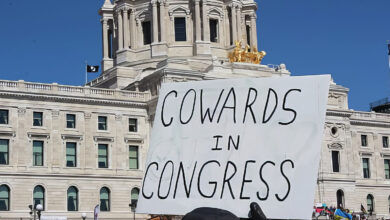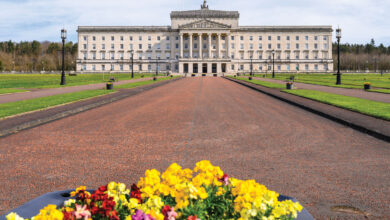Standards for press officers
 Executive press officers are rejecting a code of conduct used in all other parts of the UK. Peter Cheney reports.
Executive press officers are rejecting a code of conduct used in all other parts of the UK. Peter Cheney reports.
Northern Ireland Civil Service press officers are not regulated by an official code of conduct for their profession, agendaNi can confirm.
Professional journalists are bound by the Press Complaints Commission code of practice, the National Union of Journalists’ own code (also used informally by non-members) and their outlet’s own editorial guidelines.
Press officers, by comparison, are often seen as unregulated despite their growing size and influence. However, the Home Civil Service’s government communications profession is bound by a code of conduct drawn up under the Blair Government.
‘Propriety Guidance: Government Communications’ was published by the Cabinet Office in May 2007 and applies to press officers working for the UK Government, the Scottish Government and the Welsh Assembly Government.
“To work effectively,” it states, “press officers must establish their impartiality and neutrality with the news media, and ensure that they deal with all news media even-handedly.”
Press officers must not “oversell policies, re-announce achievements or investments and claim them as new, or otherwise attempt to mislead the public.” They should also make “as positive a case as the facts warrant” and insist that “all political aspects are handled by the party political press office or special adviser”.
It is accepted that ministers (and their parties) benefit politically from press coverage of their work in government. The key test is whether the information could damage the integrity of the department. Communicators “must behave in a way that will allow them to work for any future minister of any future government.”
A Cabinet Office spokesman explained that this guidance did not automatically apply to the Northern Ireland Civil Service, as the organisation was fully devolved. An OFMDFM spokesman confirmed that that it did not cover the Executive Information Service. He added that the code seemed to be “duplication” as the Civil Service had its own code of ethics.
That code of ethics takes “ethical standards governing particular professions” into account but when the point was put to him, the spokesman said the code itself was sufficient and OFMDFM had “no plans” to bring in a code for press officers.
For the record, the Civil Service code of ethics obliges officials to:
• always act in a way that is professional;
• handle information as openly as possible; and
• set out the facts and relevant issues truthfully, and correct any errors as soon as possible.
The Freedom of Information Act also requires any civil servant to respond to a request for information, whether from a journalist or a member of the public, within 20 working days. The Civil Service’s standards for dealing with customers insist on responses being made well within that timeframe.
The full guidance is published at: www.cabinetoffice.gov.uk/media/cabinetoffice/government_communication/
assets/guidance.pdf





